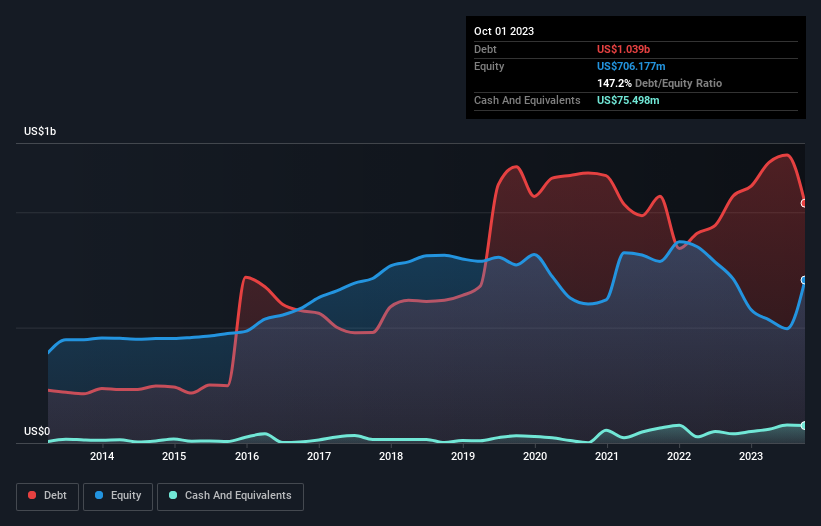Health Check: How Prudently Does NFI Group (TSE:NFI) Use Debt?

Some say volatility, rather than debt, is the best way to think about risk as an investor, but Warren Buffett famously said that 'Volatility is far from synonymous with risk.' It's only natural to consider a company's balance sheet when you examine how risky it is, since debt is often involved when a business collapses. We note that NFI Group Inc. (TSE:NFI) does have debt on its balance sheet. But is this debt a concern to shareholders?
What Risk Does Debt Bring?
Debt is a tool to help businesses grow, but if a business is incapable of paying off its lenders, then it exists at their mercy. Part and parcel of capitalism is the process of 'creative destruction' where failed businesses are mercilessly liquidated by their bankers. However, a more usual (but still expensive) situation is where a company must dilute shareholders at a cheap share price simply to get debt under control. Of course, the upside of debt is that it often represents cheap capital, especially when it replaces dilution in a company with the ability to reinvest at high rates of return. When we examine debt levels, we first consider both cash and debt levels, together.
View our latest analysis for NFI Group
How Much Debt Does NFI Group Carry?
As you can see below, NFI Group had US$1.04b of debt, at October 2023, which is about the same as the year before. You can click the chart for greater detail. However, it also had US$75.5m in cash, and so its net debt is US$963.7m.

A Look At NFI Group's Liabilities
According to the last reported balance sheet, NFI Group had liabilities of US$740.3m due within 12 months, and liabilities of US$1.32b due beyond 12 months. Offsetting these obligations, it had cash of US$75.5m as well as receivables valued at US$479.7m due within 12 months. So it has liabilities totalling US$1.50b more than its cash and near-term receivables, combined.
When you consider that this deficiency exceeds the company's US$1.08b market capitalization, you might well be inclined to review the balance sheet intently. In the scenario where the company had to clean up its balance sheet quickly, it seems likely shareholders would suffer extensive dilution. When analysing debt levels, the balance sheet is the obvious place to start. But it is future earnings, more than anything, that will determine NFI Group's ability to maintain a healthy balance sheet going forward. So if you're focused on the future you can check out this free report showing analyst profit forecasts.
In the last year NFI Group wasn't profitable at an EBIT level, but managed to grow its revenue by 25%, to US$2.6b. Shareholders probably have their fingers crossed that it can grow its way to profits.
Caveat Emptor
Despite the top line growth, NFI Group still had an earnings before interest and tax (EBIT) loss over the last year. Indeed, it lost US$86m at the EBIT level. Considering that alongside the liabilities mentioned above make us nervous about the company. We'd want to see some strong near-term improvements before getting too interested in the stock. Not least because it burned through US$150m in negative free cash flow over the last year. So suffice it to say we consider the stock to be risky. When analysing debt levels, the balance sheet is the obvious place to start. However, not all investment risk resides within the balance sheet - far from it. To that end, you should be aware of the 2 warning signs we've spotted with NFI Group .
If, after all that, you're more interested in a fast growing company with a rock-solid balance sheet, then check out our list of net cash growth stocks without delay.
Valuation is complex, but we're here to simplify it.
Discover if NFI Group might be undervalued or overvalued with our detailed analysis, featuring fair value estimates, potential risks, dividends, insider trades, and its financial condition.
Access Free AnalysisHave feedback on this article? Concerned about the content? Get in touch with us directly. Alternatively, email editorial-team (at) simplywallst.com.
This article by Simply Wall St is general in nature. We provide commentary based on historical data and analyst forecasts only using an unbiased methodology and our articles are not intended to be financial advice. It does not constitute a recommendation to buy or sell any stock, and does not take account of your objectives, or your financial situation. We aim to bring you long-term focused analysis driven by fundamental data. Note that our analysis may not factor in the latest price-sensitive company announcements or qualitative material. Simply Wall St has no position in any stocks mentioned.
About TSX:NFI
NFI Group
Manufactures and sells buses in North America, the United Kingdom, rest of Europe, and the Asia Pacific.
Very undervalued with reasonable growth potential.
Similar Companies
Market Insights
Community Narratives




